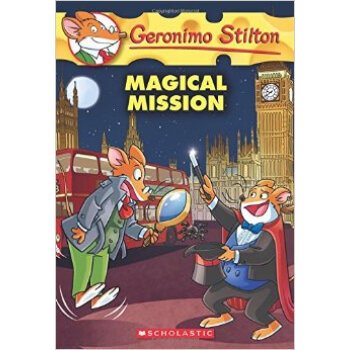![Alice's Adventures in Wonderland and Through the Looking-Glass爱丽丝漫游奇境记 英文原版 [平装] [08--11]](https://pic.windowsfront.com/19017058/10c3c5e9-8097-47e0-9b0c-43bb9b022f2a.jpg)

具体描述
内容简介
In 1862 Charles Lutwidge Dodgson, a shy Oxford mathematician with a stammer, created a story about a little girl tumbling down a rabbit hole. Thus began the immortal adventures of Alice, perhaps the most popular heroine in English literature. Countless scholars have tried to define the charm of the Alice books–with those wonderfully eccentric characters the Queen of Hearts, Tweedledum, and Tweedledee, the Cheshire Cat, Mock Turtle, the Mad Hatter et al.–by proclaiming that they really comprise a satire on language, a political allegory, a parody of Victorian children's literature, even a reflection of contemporary ecclesiastical history. Perhaps, as Dodgson might have said, Alice is no more than a dream, a fairy tale about the trials and tribulations of growing up–or down, or all turned round–as seen through the expert eyes of a child.作者简介
"Lewis Carroll," creator of the brilliantly witty Alice's Adventures in Wonderland, was a pseudonym for Charles Lutwidge Dodgson, a shy Oxford don with a stammer.He was born at Daresbury, Cheshire on January 27, 1832, son of a vicar. As the eldest boy among eleven children, he learned early to amuse his siblings by writing and editing family magazines. He was educated at Christ Church College, Oxford, where he lectured in mathematics from1855 to 1881. In 1861 he was ordained as a deacon.
Dodgson's entry into the world of fiction was accidental. It happened one "golden afternoon" as he escorted his colleague's three daughters on a trip up the river Isis. There he invented the story that might have been forgotten if not for the persistence of the youngest girl, Alice Liddell. Thanks to her, and to her encouraging friends, Alice was published in 1865, with drawings by the political cartoonist, John Tenniel. After Alice, Dodgson wrote Phantasmagoria and Other Poems (1869), Through the Looking-Glass (1871), The Hunting of Shark (1876, and Rhyme? and Reason? (1883).
As a mathematician Dodgson is best known for Euclid and His Modern Rivals (1879). He was also a superb children's photographer, who captured the delicate, sensuous beauty of such little girls as Alice Liddell and Ellen Terry, the future actress. W.H. Auden called him "one of the best portrait photographer of the century." Dodgson was also an inventor; his projects included a game of arithmetic croquet, a substitute for glue, and an apparatus for making notes in the dark. Though he sought publication for his light verse, he never dreamed his true gift–telling stories to children–merited publication or lasting fame, and he avoided publicity scrupulously Charles Dodgson died in 1898 of influenza.
内页插图
精彩书评
"Only Lewis Carroll has shown us the world upside down as a child sees it, and has made us laugh as children laugh."--Virginia Woolf
精彩书摘
Chaoter IAlice was beginning to get very tired of sitting by her sister on the bank and of having nothing to do: once or twice she had peeped into the book her sister was reading, but it had no pictures or conversations in it, "and what is the use of a book," thought Alice, "without pictures or conversations?"
So she was considering, in her own mind (as well as she could, for the hot day made her feel very sleepy and stupid), whether the pleasure of making a daisy-chain would be worth the trouble of getting up and picking the daisies, when suddenly a White Rabbit with pink eyes ran close by her.
There was nothing so very remarkable in that; nor did Alice think it so very much out of the way to hear the Rabbit say to itself "Oh dear! Oh dear! I shall be too late!" (when she thought it over afterwards it occurred to her that she ought to have wondered at this, but at the time it all seemed quite natural); but, when the Rabbit actually took a watch out of its waistcoat-pocket, and looked at it, and then hurried on, Alice started to her feet, for it flashed across her mind that she had never before seen a rabbit with either a waistcoat-pocket, or a watch to take out of it, and burning with curiosity, she ran across the field after it, and was just in time to see it pop down a large rabbit-hole under the hedge.
In another moment down went Alice after it, never once considering how in the world she was to get out again.
The rabbit-hole went straight on like a tunnel for some way, and then dipped suddenly down, so suddenly that Alice had not a moment to think about stopping herself before she found herself falling down what seemed to be a very deep well.
Either the well was very deep, or she fell very slowly, for she had plenty of time as she went down to look about her, and to wonder what was going to happen next. First, she tried to look down and make out what she was coming to, but it was too dark to see anything: then she looked at the sides of the well, and noticed that they were filled with cupboards and book-shelves: here and there she saw maps and pictures hung upon pegs. She took down a jar from one of the shelves as she passed: it was labelled "ORANGE MARMALADE" but to her great disappointment it was empty: she did not like to drop the jar, for fear of killing somebody underneath, so managed to put it into one of the cupboards as she fell past it.
"Well!" thought Alice to herself. "After such a fall as this, I shall think nothing of tumbling down-stairs! How brave they'll all think me at home! Why, I wouldn't say anything about it, even if I fell off the top of the house!" (Which was very likely true.)
Down, down, down. Would the fall never come to an end? "I wonder how many miles I've fallen by this time?" she said aloud. "I must be getting somewhere near the centre of the earth. Let me see: that would be four thousand miles down, I think–" (for, you see, Alice had learnt several things of this sort in her lessons in the school-room, and though this was not a very good opportunity for showing off her knowledge, as there was no one to listen to her, still it was good practice to say it over) "–yes, that's about the right distance–but then I wonder what Latitude or Longitude I've got to?" (Alice had not the slightest idea what Latitude was, or Longitude either, but she thought they were nice grand words to say.)
Presently she began again. "I wonder if I shall fall right through the earth! How funny it'll seem to come out among the people that walk with their heads downwards! The antipathies, I think–" (she was rather glad there was no one listening, this time, as it didn't sound at all the right word) "–but I shall have to ask them what the name of the country is, you know. Please, Ma'am, is this New Zealand? Or Australia?" (and she tried to curtsey as she spoke–fancy, curtseying as you're falling through the air! Do you think you could manage it?) "And what an ignorant little girl she'll think me for asking! No, it'll never do to ask: perhaps I shall see it written up somewhere."
Down, down, down. There was nothing else to do, so Alice soon began talking again. "Dinah'll miss me very much to-night, I should think!" (Dinah was the cat.) "I hope they'll remember her saucer of milk at tea-time. Dinah, my dear! I wish you were down here with me! There are no mice in the air, I'm afraid, but you might catch a bat, and that's very like a mouse, you know. But do cats eat bats, I wonder?" And here Alice began to get rather sleepy, and went on saying to herself, in a dreamy sort of way, "Do cats eat bats? Do cats eat bats?" and sometimes "Do bats eat cats?" for, you see, as she couldn't answer either question, it didn't much matter which way she put it. She felt that she was dozing off, and had just begun to dream that she was walking hand in hand with Dinah, and was saying to her, very earnestly, "Now, Dinah, tell me the truth: did you ever eat a bat?" when suddenly, thump! thump! down she came upon a heap of sticks and dry leaves, and the fall was over.
Alice was not a bit hurt, and she jumped up on to her feet in a moment: she looked up, but it was all dark overhead: before her was another long passage, and the White Rabbit was still in sight, hurrying down it. There was not a moment to be lost: away went Alice like the wind, and was just in time to hear it say, as it turned a corner, "Oh my ears and whiskers, how late it's getting!" She was close behind it when she turned the corner, but the Rabbit was no longer to be seen: she found herself in a long, low hall, which was lit up by a row of lamps hanging from the roof.
There were doors all around the hall, but they were all locked; and when Alice had been all the way down one side and up the other, trying every door, she walked sadly down the middle, wondering how she was ever to get out again.
Suddenly she came upon a little three-legged table, all made of solid glass: there was nothing on it but a tiny golden key, and Alice's first idea was that this might belong to one of the doors of the hall; but, alas! either the locks were too large, or the key was too small, but at any rate it would not open any of them. However, on the second time round, she came upon a low curtain she had not noticed before, and behind it was a little door about fifteen inches high: she tried the little golden key in the lock, and to her great delight it fitted!
Alice opened the door and found that it led into a small passage, not much larger than a rat-hole: she knelt down and looked along the passage into the loveliest garden you ever saw. How she longed to get out of that dark hall, and wander about among those beds of bright flowers and those cool fountains, but she could not even get her head through the doorway; "and even if my head would go through," thought poor Alice, "it would be of very little use without my shoulders. Oh, how I wish I could shut up like a telescope! I think I could, if I only knew how to begin." For, you see, so many out-of-the-way things had happened lately, that Alice had begun to think that very few things indeed were really impossible.
There seemed to be no use in waiting by the little door, so she went back to the table, half hoping she might find another key on it, or at any rate a book of rules for shutting people up like telescopes: this time she found a little bottle on it ("which certainly was not here before," said Alice), and tied around the neck of the bottle was a paper label, with the words "DRINK ME" beautifully printed on it in large letters.
It was all very well to say "Drink me," but the wise little Alice was not going to do that in a hurry. "No, I'll look first," she said, "and see whether it's marked 'poison' or not"; for she had read several nice little stories about children who had got burnt, and eaten up by wild beasts, and other unpleasant things, all because they would not remember the simple rules their friends had taught them: such as, that a red-hot poker will burn you if you hold it too long; and that, if you cut your finger very deeply with a knife, it usually bleeds; and she had never forgotten that, if you drink much from a bottle marked "poison," it is almost certain to disagree with you, sooner or later.
However, this bottle was not marked "poison," so Alice ventured to taste it, and, finding it very nice (it had, in fact, a sort of mixed flavour of cherry-tart, custard, pineapple, roast turkey, toffee, and hot buttered toast), she very soon finished it off.
"What a curious feeling!" said Alice. "I must be shutting up like a telescope!"
And so it was indeed: she was now only ten inches high, and her face brightened up at the thought that she was now the right size for going through the little door into that lovely garden. First, however, she waited for a few minutes to see if she was going to shrink any further: she felt a little nervous about this; "for it might end, you know," said Alice to herself, "in my going out altogether, like a candle. I wonder what I should be like then?" And she tried to fancy what the flame of a candle looks like after the candle is blown out, for she could not remember ever having seen such a thing.
After a while, finding that nothing more happened, she decided on going into the garden at once; but, alas for poor Alice! when she got to the door, she found she had forgotten the little golden key, and when she went back to the table for it, she found she could not possibly reach it: she could see it quite plainly through the glass, and she tried her best to climb up one of the legs of the table, but it was too slippery; and when she had tired herself out with trying, the poor little thing sat down and cried.
用户评价
这次的阅读体验,与其说是读一本书,不如说是一次深入心灵的对话。初次接触这本书,我被它的标题所吸引,以为会是一个轻松愉快的童话,然而,随着阅读的深入,我发现它远不止于此。书中通过爱丽丝的视角,对成人世界的荒诞和不合逻辑进行了深刻的讽刺。那些所谓的“规则”在仙境中被彻底颠覆,那些“正常”的对话变得支离破碎,这种强烈的反差让我在忍俊不禁的同时,也不禁思考起我们现实生活中的许多“理所当然”。作者的语言充满了智慧,字里行间流露出对人性、对社会现象的洞察。我特别欣赏书中的一些对话,它们看似无厘头,实则蕴含着深意,仿佛在挑战我们固有的思维模式。爱丽丝在经历这一切时所表现出的坚持和困惑,也让我深有共鸣。她试图理解这个世界,但又始终保持着一份纯真和质疑,这种态度正是我们在面对复杂现实时所需要的。这本书不仅仅是给孩子的,更是给所有在成人世界中感到迷失的灵魂的。它提醒我们,即使身处困境,也不要忘记保持一颗探索的心,不要害怕质疑,因为真正的智慧往往隐藏在那些看似疯狂的想法之中。
评分这本书就像一扇通往另一个维度的门,一旦踏入,便再也无法回到原来的轨道。从我拿到这本书的那一刻起,我就被它独特的魅力所俘获。爱丽丝的旅程不是一条直线,而是一连串的惊喜和意外。我被书中那些天马行空的想象力深深折服,那些会动的扑克牌、能够说话的动物、以及那些变化莫测的场景,都如同电影画面一般在我脑海中闪过。作者的叙事方式非常巧妙,他能够将最不合逻辑的事情描绘得栩栩如生,让人不得不相信那些荒诞的现实。我尤其喜欢书中对于梦境和现实的模糊界定,这种界限的模糊让整个故事充满了神秘感和不可预测性。每一次爱丽丝的改变,无论是身体大小的变化,还是周围环境的瞬间切换,都让我感到既惊奇又兴奋。这本书不仅仅是情节上的引人入胜,更在于它对想象力的极致发挥。它鼓励读者跳出思维定势,去拥抱那些不寻常的可能性。我常常会反复阅读其中的一些段落,因为我发现每一次阅读都能发现新的细节,新的理解。这本书就像一个永远不会枯竭的宝藏,每次挖掘都能收获新的惊喜。
评分这本书带给我的感受,是一种久违的纯粹的阅读乐趣,仿佛回到了童年时光,被一个充满了魔法和惊喜的故事所包裹。我被爱丽丝的视角所吸引,跟着她一起踏上了一段匪夷所思的旅程。书中的每一个场景都充满了画面感,仿佛作者将我们直接置身于那个奇妙的世界之中。我喜欢那些出人意料的转折,每一次爱丽丝遇到的新角色,每一次她进入的新场景,都让我充满期待。书中的幽默感非常独特,它不是那种直白的笑话,而是隐藏在情节和对话的巧妙之处,让人在回味中感受到一种会心的微笑。我尤其欣赏作者对想象力的不设限,他能够将最不可能的事情变得合情合理,这种能力实在是令人惊叹。爱丽丝的旅程,与其说是在寻找出路,不如说是在不断地发现这个世界的奇妙之处。这本书就像一串闪闪发光的珍珠,每一颗都蕴含着独特的色彩和光芒,串联在一起,便成了这个令人难忘的奇境。它让我重新相信,生活充满了无限的可能性,只要我们敢于去探索,敢于去想象。
评分这本书简直是我近期阅读中最令人惊艳的宝石!从翻开第一页起,我就被一种奇妙的力量深深吸引,仿佛瞬间穿越到了一个颠覆常理、充满想象力的世界。作者以其天马行空的构思,构建了一个如此生动鲜活的爱丽丝,她的好奇心、她的迷茫、她的勇气,都仿佛触手可及。读着爱丽丝在仙境中的种种奇遇,时而是与脾气古怪的疯帽子喝茶,时而是与高傲的红心王后周旋,每一个场景都充满了令人捧腹的幽默和令人回味的哲思。这本书的文字本身就如同魔法,充满了精巧的比喻和意想不到的转折,让人在字里行间感受到一种独特的韵律感。我尤其喜欢书中对角色设定的独到之处,每一个配角都个性鲜明,无论是狡黠的柴郡猫,还是行动迟缓的渡渡鸟,都给我留下了深刻的印象。这不仅仅是一个童话故事,更像是一场关于成长、关于认知、关于现实与虚幻之间界限的探索。它让我重新审视了许多习以为常的事物,甚至在阅读过程中,我时不时会停下来,思考书中所传达的某种隐喻,那种感觉非常奇妙。平装的版本也恰到好处,便于携带,随时随地都能沉浸在这场奇妙的旅程中。
评分这是一本能够唤醒内心沉睡的孩子,并让成年人重新审视世界的奇书。我必须承认,这本书的内容远超出了我最初的预期。我原本以为会是一个简单的童话故事,但很快我就意识到,它蕴含着深刻的哲理和对现实的巧妙讽刺。爱丽丝的经历,与其说是冒险,不如说是她对这个荒谬世界的探索与质疑。书中充斥着各种奇怪的角色和离奇的情节,这些元素的组合,恰恰展现了作者对成人世界的洞察。那些规则的制定者,那些遵循规则的人,在作者的笔下显得如此滑稽而可笑。我特别喜欢书中对语言的运用,那些双关语、那些逻辑上的混乱,都仿佛在嘲弄我们对“正常”的定义。爱丽丝在其中扮演的角色,不仅仅是观察者,更是挑战者。她用自己的方式试图理解这个世界,即便屡屡碰壁,也未曾放弃。这本书让我深刻地意识到,很多我们认为理所当然的事情,或许只是因为我们从未去质疑过它们。它是一次关于认知升级的旅程,一次对既定现实的挑战。
评分不错。。。。。。。。。。。。
评分也太超值了吧,本来每个月预算100元买3本书,结果这次200买了14本,本来还想叫我哥也帮我买一单,后来还是忍住了,总而言之,这是一个很愉快的购物经历,给京东自营点赞。
评分不错,送货快,给孩子,挺好的
评分好用不贵,价格实惠,物美价廉,物有所值,惊喜连连,物超所值,品质保证,货票同行,真心不错,值得推荐,货真价实,童叟无欺,超人图图,值得信赖,五星级的态度,五星级的质量,五星级的服务,五星级的店铺,很给力,超赞
评分书很好很轻很满意孩子读的暂时先囤货 谢谢很喜欢
评分挺好的小书,写的不错。用来消磨时光,练习阅读。
评分不错的书,看过电影,再来学习原著
评分好小的一本哦,国外的书都是环保再生纸
评分开本很小,用纸像报纸,随身带着很轻便。不错~
相关图书
本站所有内容均为互联网搜索引擎提供的公开搜索信息,本站不存储任何数据与内容,任何内容与数据均与本站无关,如有需要请联系相关搜索引擎包括但不限于百度,google,bing,sogou 等
© 2026 book.coffeedeals.club All Rights Reserved. 静流书站 版权所有

![holes原版小说 寻宝小子 英文原版 [9岁及以上] pdf epub mobi 电子书 下载](https://pic.windowsfront.com/19035909/56aecf20Nde7b5b04.jpg)

![Me Before You A Novel (Movie Tie-In) 我就要你好好的 遇见你之前 英文原版 [平装] pdf epub mobi 电子书 下载](https://pic.windowsfront.com/19638552/57844cecN3ad820dd.jpg)
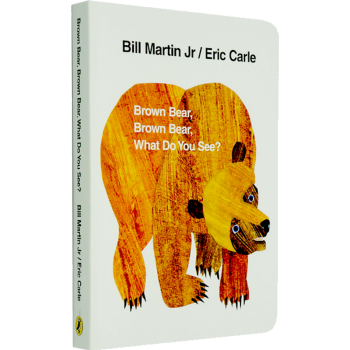
![Robinson Crusoe鲁滨逊漂流记 英文原版 [平装] [NA--NA] pdf epub mobi 电子书 下载](https://pic.windowsfront.com/19017077/rBEhU1I4MnAIAAAAAAEO7TV7a34AADQdQOaSDAAAQ8F088.jpg)
![Frog and Toad All Year (I Can Read, Level 2)青蛙和蟾蜍的一年 英文原版 [平装] [4-8岁] pdf epub mobi 电子书 下载](https://pic.windowsfront.com/19004932/550be659N510f6e1e.jpg)
![Illustrated Stories from Shakespeare莎士比亚的绘本故事 Usborne英文原版 [精装] [7岁及以上] pdf epub mobi 电子书 下载](https://pic.windowsfront.com/19023302/2b6d92e1-d132-4549-be2a-249e5f678c86.jpg)
![Splat the Cat Storybook Collection啪嗒猫故事合集 英文原版 [精装] pdf epub mobi 电子书 下载](https://pic.windowsfront.com/19282613/55892a0eNdf0aab02.jpg)
![Mouse Overboard! (Geronimo Stilton #62)老鼠记者62:落海惊魂 [7岁以上] pdf epub mobi 电子书 下载](https://pic.windowsfront.com/19573698/569c9b48Ncbf9e56a.jpg)
![Geronimo Stilton #52: Mouse in Space! 老鼠记者52:太空鼠 英文原版 [平装] [7岁以上] pdf epub mobi 电子书 下载](https://pic.windowsfront.com/19278479/rBEQWVEnS6YIAAAAAAC28wGKaLkAAA6JgAFqE8AALcL037.jpg)
![Bollywood Burglary (Geronimo Stilton #65) 老鼠记者65:宝莱坞入室盗窃案 [7-10岁] pdf epub mobi 电子书 下载](https://pic.windowsfront.com/19851557/5aba16eaNe0e1a1bf.jpg)
![老鼠记者Operation: Secret Recipe (Geronimo Stilton #66) [平装] [7岁以上] pdf epub mobi 电子书 下载](https://pic.windowsfront.com/130000016252/5a604b07N36057263.jpg)

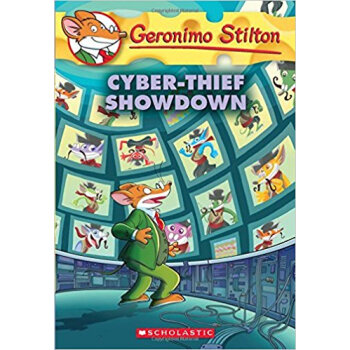
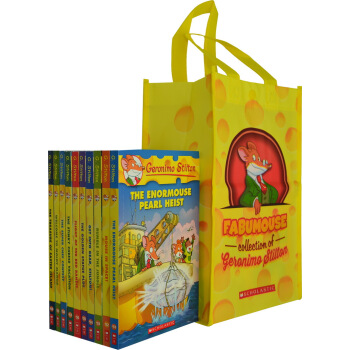
![SGeronimo Stilton #53: Rumble in the Jungle 老鼠记者 #53:丛林大战 [平装] [7-10岁] pdf epub mobi 电子书 下载](https://pic.windowsfront.com/19280200/rBEQWVFnoaUIAAAAAADyYAI_veYAAD91gHVxT4AAPJ4680.jpg)
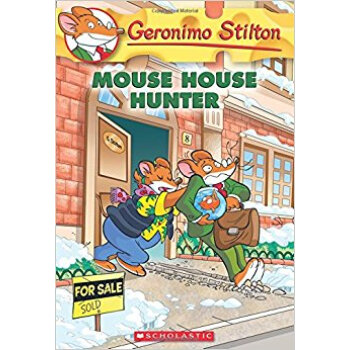
![The Art of Zootopia 《疯狂动物城》电影艺术画册 英文原版 [平装] pdf epub mobi 电子书 下载](https://pic.windowsfront.com/19574886/56dd2922Nf69f567a.jpg)
![The Complete Adventures of Curious George: 75th 好奇乔治猴冒险全集 英文原版 [平装] [4-7岁] pdf epub mobi 电子书 下载](https://pic.windowsfront.com/19647623/57cd4b47Nb2a79eba.jpg)
